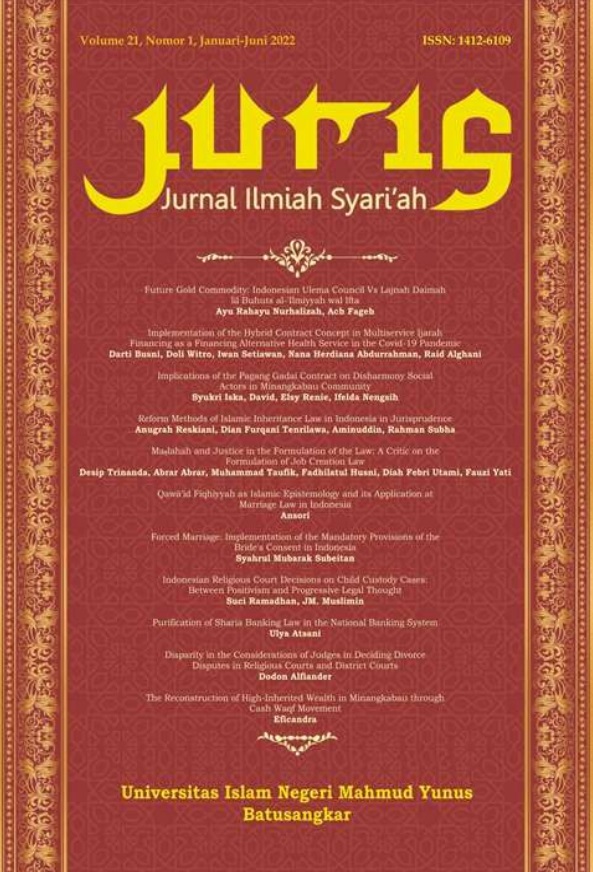Sharia Economic Bankruptcy Law (al-Taflis) and the Dualism of Court Competency in Indonesia
DOI:
https://doi.org/10.31958/juris.v23i2.11045Keywords:
CourtÔÇÖs Competency, al-Taflis, Sharia Economy, Bankruptcy, SynchronizationAbstract
Since Religious Court Law was amended by Law No. 3 of 2006, every sharia economic case is stipulated as the competency of the Religious Court. Conversely, Bankruptcy Law No. 37 of 2004 has never been synchronized with the amended Religious Courts Law. Therefore, the competent court does not handle sharia economic bankruptcy (al-taflis) cases. This study aims to ensure that al-taflis can be examined based on sharia economic principles by the most appropriate judicial forum. It is normative legal research using primary and secondary legal materials such as court decisions, statutory, books, journals, reports, and internet sources, then analyzing and synchronizing to get an ideal formula regarding how al-taflis cases are settled in court. The result shows that al-taflis is appropriately stipulated as the absolute competence of Religious Courts. Case studies of al-taflis court decisions settled by the Commercial Court so far, also indicate that sharia principles are not sufficiently considered in the decisions, even ignored. Therefore, it is urgent to make synchronization efforts by amending the Bankruptcy Law until it can accommodate the settlement of al-taflis case through Religious Courts. Otherwise, it will be only a utopian sharia economic bankruptcy law
References
Abdul-Rahman, A., Abdul Latif, R., Muda, R., & Abdullah, M. A. (2014). Failure and potential of profit-loss sharing contracts: A perspective of New Institutional, Economic (NIE) Theory. Pacific-Basin Finance Journal, 28, 136–151. https://doi.org/10.1016/j.pacfin.2014.01.004
Abdulahanaa, A. (2021). A Review of Islamic Economic Law on Religious Tourism Arrangements in South Sulawesi. Samarah: Jurnal Hukum Keluarga Dan Hukum Islam, 5(1), 450. https://doi.org/10.22373/sjhk.v5i1.9088
Al-Asqalani, A.-H. I. H. (2015). Bulughul Maram. Pustaka Al-Kautsar.
Al-Barashdi, S., & Yeung, H. (2018). An Assessment of Various Theoretical Approaches to Bankruptcy Law. Journal of Arts and Social Sciences [JASS], 9(1), 23–36. https://doi.org/10.53542/jass.v9i1.2624
Al-Daghistani, S. (2023). Beyond Maṣlaḥah: Adab and Islamic Economic Thought. American Journal of Islam and Society, 39(3–4), 57–86. https://doi.org/10.35632/ajis.v39i3-4.2988
Al Anshori, M. Z. (2016). The role of Islam in Indonesia’s contemporary foreign policy [Victoria University of Wellington]. https://doi.org/10.26686/wgtn.17014601.v1
Antonio, M. S. (2001). Bank Syari’ah: Dari Teori ke Praktik. Gema Insani Press.
Arianti, M. L. dan F. (2019). pola akad dalam pemberdayaan ekonomi masyarakat perantau atar. Juris Jurnal Ilmiah Syari’ah, 18, 2.
Armia, M. S. (2015). Constitutional courts and law reform: a case study of Indonesia [Anglia Ruskin University]. https://hdl.handle.net/10779/aru.23765400.v1
Az-Zuhaili, W. (2005). Al-Fiqh al-Islam wa Adillatuhu. Daar al-Fikr.
Bani Ata, H. M. A. (2019). Addressing financial bankruptcy from the Islamic perspective. Banks and Bank Systems, 14(3), 9–19. https://doi.org/10.21511/bbs.14(3).2019.02
Batubara, S. (2017). Kepemilikan Relatif (Al-Milkiyah Al-Muqayyadah) Privat dan Publik dalam Ekonomi Islam. JURIS (Jurnal Ilmiah Syariah), 16(2), 173. https://doi.org/10.31958/juris.v16i2.971
Blazy, R., & Stef, N. (2020). Bankruptcy procedures in the post-transition economies. European Journal of Law and Economics, 50(1), 7–64. https://doi.org/10.1007/s10657-019-09634-5
Butt, S., & Lindsey, T. (2018). Indonesian law. Oxford University Press.
Cerón, J. M. (2012). Going “ Distress ” on the WACC : Theoretical and Empirical Analysis. Universidad Autónoma de Madrid.
Coordes, L. (2019). Reorganizing Health Care Bankruptcy. Boston College Law Review, 419, 52. https://ssrn.com/abstract=3346145
Djamil, F. (2013). Hukum Ekonomi Islam: Sejarah, Teori dan Konsep. Sinar Grafika.
El-Masry, A. A., de Mingo-López, D. V., Matallín-Sáez, J. C., & Tortosa-Ausina, E. (2016). Environmental conditions, fund characteristics, and Islamic orientation: An analysis of mutual fund performance for the MENA region. Journal of Economic Behavior & Organization, 132, 174–197. https://doi.org/10.1016/j.jebo.2016.10.015
Elvia, E. E., Mujib, A., Nor, A., & Akbar, M. I. (2023). BASYARNAS as a Place for Dispute Resolution of Musyarakah Financing in Sharia Banking in the Disruption Era. El-Mashlahah, 13(1), 39–56. https://doi.org/10.23971/el-mashlahah.v13i1.5345
Faisal, A., Saidah, S., Mukrimin, M., Zakirah, Z., & Darwis, R. (2023). Sociological and Political Constraints of Islamic Sharia Enforcement in South Sulawesi Indonesia. JURIS (Jurnal Ilmiah Syariah), 22(1), 159. https://doi.org/10.31958/juris.v22i1.8604
Faizah, N., & Azzahra, D. (2022). Kompetensi Pengadilan Niaga Terhadap Kepailitan Debitor Berdasarkan Wanprestasi Akad Pembiayaan Syariah. Al-Mizan : Jurnal Hukum Dan Ekonomi Islam, 6(2), 126–139. https://doi.org/https://ejurnal.iiq.ac.id/index.php/almizan/article/view/761
Friedman, L. M. (2019). A History of American Law. Oxford University PressNew York. https://doi.org/10.1093/oso/9780190070885.001.0001
Ginting, E. R. (2018). Hukum Kepailitan: Teori Kepailitan. Bumi Aksara.
Hamoudi, H. A. (2011). Legal Studies Research Paper Series The Surprising Irrelevance of Islamic Bankruptcy University of Pittsburgh School of Law. American Bankruptcy Institute Law Review, 19(November), 505. http://ssrn.com/abstract=1957825
Harahap, M. Y. (2017). Hukum acara perdata: tentang gugatan, persidangan, penyitaan, pembuktian, dan putusan pengadilan. Sinar Grafika.
Hariyanto, E., & Hamzah, M. (2022). Bibliometric Analysis of the Development of Islamic Economic Dispute Resolution Research in Indonesia. Juris: Jurnal Ilmiah Syariah, 21(2), 221–233. https://doi.org/10.31958/juris.v21i2.6997
Harun, M. (2019). Philosophical Study of Hans Kelsen’s Thoughts on Law and Satjipto Rahardjo’s Ideas on Progressive Law. Walisongo Law Review (Walrev), 1(2), 195. https://doi.org/10.21580/walrev.2019.1.2.4815
Hayati, R. F., & Mujib, A. (2022). Dispute Resolution on Muḍārabah Musytarakah Contract on Sharia Insurance in Indonesia: Between Regulation and Practice. El-Mashlahah, 12(1), 14–36. https://doi.org/10.23971/elma.v12i1.3795
Herijanto, H. (2020). Pertimbangan hakim dalam penyelesaian sengketa akad pembiayaan syariah di Indonesia, Malaysia, dan Inggris [Sekolah Pascasarjana UIN Syarif Hidayatullah Jakarta]. https://repository.uinjkt.ac.id/dspace/handle/123456789/51311
Hidayah, N., Azis, A., Mutiara, T., & Larasati, D. (2023). Sharia Banking Disputes Settlement: Analysis of Religious Court Decisions in Indonesia. Al-Risalah: Forum Kajian Hukum Dan Sosial Kemasyarakatan, 23(1), 75–92. https://doi.org/10.30631/alrisalah.v23i1.1347
Huda, M., & Ahyani, H. (2024). Normative Justice and Implementation Related to Sharia Economic Law Disputes in Realizing Legal Certainty and Justice in Indonesia. Al-Risalah: Forum Kajian Hukum Dan Sosial Kemasyarakatan, 24(1), 103–119. https://doi.org/10.30631/alrisalah.v24i1.1467
Irianto, C. (2015). Penerapan Asas Kelangsungan Usaha dalam Penyelesaian Perkara Kepailitan dan Penundaan Kewajiban Pembayaran Utang. Jurnal Hukum Dan Peradilan, 4(3), 399. https://doi.org/10.25216/jhp.4.3.2015.399-418
Kartika, S., & Harahap, M. Y. (2023). Kewenangan Mengadili Dalam Penyelesaian Perkara Kepailitan dan Penundaan Kewajiban Pembayaran Utang Perbankan Syariah. AL-MANHAJ: Jurnal Hukum Dan Pranata Sosial Islam, 5(1), 101–112. https://doi.org/10.37680/almanhaj.v5i1.2195
Kholid, M. (2020). Kepastian Hukum dalam Penyelesaian Sengketa Ekonomi Syariah Kepailitan dihubungkan dengan undang-undang nomor 37 tahun 2004 tentang kepailitan dan penundaan kewajiban pembayaran utang. UIN Sunan Gunung Djati Bandung.
Kuran, T. (2018). Islam and Economic Performance: Historical and Contemporary Links. Journal of Economic Literature, 56(4), 1292–1359. https://doi.org/10.1257/jel.20171243
Kusumaningtyas, R. O., Subekti, R., Jaelani, A. K., Orsantinutsakul, A., & Mishra, U. K. (2022). Reduction of Digitalization Policy in Indonesian MSMEs and Implications for Sharia Economic Development. JURIS (Jurnal Ilmiah Syariah), 21(2), 157. https://doi.org/10.31958/juris.v21i2.6855
Lamijan, & Tohari, M. (2022). Kemandirian dan Kemerdekaan Kekuasaan Kehakiman di Indonesia. JPeHI (Jurnal Penelitian Hukum Indonesia), 3(1), 30–48. https://doi.org/10.61689/jpehi.v3i1.333
McMillen, M. J. T. (2012). An Introduction to Shari’ah Considerations in Bankruptcy and Insolvency Contexts and Islamic Finance’s First Bankruptcy (East Cameron). SSRN Electronic Journal. https://doi.org/10.2139/ssrn.1826246
Mertokusumo, S. (2019). Mengenal Hukum Suatu Pengantar. Maha Karya Pustaka.
Nadira, I. (2021). Studi Komparatif Terhadap Kepailitan Perusahaan Asuransi Syariah Menurut Hukum Islam Dan Undang-Undang No 37 Tahun 2004 Tentang Kepailitan Dan Penundaan Kewajiban Pembayaran Utang (PKPU). Iuris Studia: Jurnal Kajian Hukum, 2(2), 257–263. https://doi.org/10.55357/is.v2i2.131
Nsubuga, H. J. (2018). The interpretative approach to bankruptcy law. International Journal of Law and Management, 60(3), 824–841. https://doi.org/10.1108/IJLMA-03-2017-0079
Nugroho, L. (2019). Comparison of At Taflis Wal Hajr in Islamic Law and Bankruptcy in Positive Law. Proceedings of the International Conference on Social Science 2019 (ICSS 2019). https://doi.org/10.2991/icss-19.2019.134
Nugroho, L. D. (2022). Konstruksi Hukum Kepailitan Syariah di Indonesia. Scopindo Media Pustaka.
Prihasmoro, A. (2023). Penyelesaian Kepailitan Ekonomi Syariah di Peradilan Indonesia. Dialektika.
Rahardjo, S. (2011). Hukum Progresif Hukum Yang Membebaskan. Jurnal Hukum Progresif, 1(1), 1–24. https://doi.org/10.14710/hp.1.1.1-24
Rahmi, S. (2017). Kedudukan dan Fungsi Yudikatif sebagai Pemegang Kekuasaan Kehakiman Dalam Sistem Negara Hukum di Indonesia. Islam Transformatif: Jurnal of Islamic Studies, 1(2). https://doi.org/10.30983/it.v1i2.421
Rusyd, A. al-W. M. bin A. I. (2004). Bidayah al-Mujtahid Wa Nihayah al-Muqtashid (Juz I). Dar al-Hadits.
Saprudin, A., & Satiri, A. (2018). Teknik penyelesaian perkara kepailitan ekonomi syariah. Pustaka Pelajar.
Saputera, A. R. A. (2019). Penyelesaian Sengketa Ekonomi Syariah di Indonesia. Nizham Journal of Islamic Studies, 7(01), 131–148.
Seider, M. A., Goldberg, A. J., & Adams, C. (2016). Maximizing Enterprise Value and Minimizing “Hold Up Value”: Reorganizations in the United States under Chapter 11 of the US Bankruptcy Code. In Global Insolvency and Bankruptcy Practice for Sustainable Economic Development (pp. 79–117). Palgrave Macmillan UK. https://doi.org/10.1007/978-1-137-56175-6_3
Sriani, E., Hasan, F., & Ma’mun, S. (2023). Violation of Human Right for Collateral Fraud in Sharia Financial Institution Based on Fiduciary Guaranty Law and Rahn Law. JURIS (Jurnal Ilmiah Syariah), 22(1), 133. https://doi.org/10.31958/juris.v22i1.9157
Suadi, A. (2021). Hukum Kepailitan Syariah (Al-Taflis) Dalam Penyelesaian Sangketa Ekonomi Syariah. Kencana.
Sulistiani, S. L. (2021). Peradilan Islam. Bumi Aksara.
Sunarmi, S., Sukarja, D., & Lubis, T. M. (2021). The Standings of Tax Receivables in Bankruptcy Cases : A Study on Managing and Settling Assets. Syiah Kuala Law Journal, 5(3), 329–344. https://doi.org/10.24815/sklj.v5i3.23347
Supriatna, A., Umiyati, & Kamal, M. (2022). The Influence of Sharia Compliance and Islamic Corporate Governance on Fraud. ITQAN: Journal of Islamic Economics, Management, and Finance, 1(2), 68–80. https://doi.org/10.57053/itqan.v1i2.12
Suryani, I., Muhtar, M. H., Rahman, Y. M., Mega Jaya, B. P., & Khalaf, A. Al. (2023). Integration of Islamic Law in Regional Development in Indonesia. JURIS (Jurnal Ilmiah Syariah), 22(1), 1. https://doi.org/10.31958/juris.v22i1.8770
Syarifudin, A. (2017). Penyelesaian Perkara Kepailitan Ekonomi Syariah [UIN Sunan Kalijaga Yogyakarta]. http://digilib.uin-suka.ac.id/id/eprint/26494
Wahyudi, F. (2019). The Quo Vadis of Bankruptcy Settlement and PKPU Laws on Sharia Banking. Jurnal Hukum Dan Peradilan, 8(1), 1. https://doi.org/10.25216/jhp.8.1.2019.1-20
Watif, M., Atira, F., & Irwana, D. K. (2024). Understanding Law and Society in Legal Sociology Studies. Agency Journal of Management and Business, 4(1), 1–7.
Widjajati, E. (2019). Penyelesaian sengketa Kepailitan Menurut Hukum Perbankan Syariah. AHKAM : Jurnal Ilmu Syariah, 15(1), 117–126. https://doi.org/10.15408/ajis.v15i1.2855
Yunita, P. (2020). The Future of Indonesia Islamic Banking Industry: Bankruptcy Analyzing the Second Wave of Global Financial Crisis. International Journal of Islamic Economics and Finance (IJIEF), 3(2), 199–226. https://doi.org/10.18196/ijief.3227
Zada, K., Suparta, M., Ruswadi, B., Dahri, H., & Sahid, M. M. (2022). Constitutionalizing Sharia: Identity and Independence of Islamic Politics Among Students. JURIS (Jurnal Ilmiah Syariah), 21(2), 195–206. https://doi.org/10.31958/juris.v21i2.6954
Zhao, H. (2020). The Legislative Goals of the Enterprise Bankruptcy Law of the PRC. In Government Intervention in the Reorganisation of Listed Companies in China (pp. 45–76). Cambridge University Press. https://doi.org/10.1017/9781108634557.002
Zulkarnain. (2021). Hukum Komtetensi Peradilan Agama: Pergeseran Kompetensi Peradilan Agama dalam Hukum Positif di Indonesia. Prenada Media.
Zywicki, T. J., & Rajagopalan, S. (2017). Bankruptcy judge as a central planner. In Research Handbook on Austrian Law and Economics. Edward Elgar Publishing. https://doi.org/10.4337/9781788113106.00025
Interview
Suadi, Amran. (2022). Chairman of the Religious Chamber of the Republic of Indonesia Supreme Court. Interview, July 25.
Sumanatha, I. G. A. (2022). Chairman of the Civil Chamber of the Republic of Indonesia Supreme Court. Interview, August 18.
Downloads
Published
How to Cite
Issue
Section
License
Copyright (c) 2024 Adi Prihasmoro, Yayan Sopyan, Raihanah Abdullah, Sufiarina

This work is licensed under a Creative Commons Attribution-NonCommercial-NoDerivatives 4.0 International License.
Authors who publish with this journal agree to the following terms:- Authors retain copyright and grant the journal right of first publication with the work simultaneously licensed under a Creative Commons Attribution License that allows others to share the work with an acknowledgement of the work's authorship and initial publication in this journal.
- Authors are able to enter into separate, additional contractual arrangements for the non-exclusive distribution of the journal's published version of the work (e.g., post it to an institutional repository or publish it in a book), with an acknowledgement of its initial publication in this journal.
- Authors are permitted and encouraged to post their work online (e.g., in institutional repositories or on their website) prior to and during the submission process, as it can lead to productive exchanges, as well as earlier and greater citation of published work (See The Effect of Open Access).








